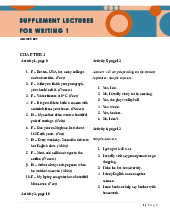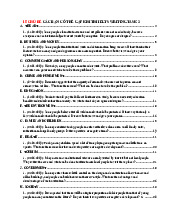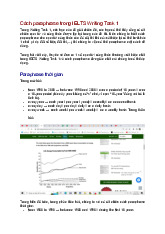


Preview text:
WRITING Task 1
You should spend about 20 minutes on this task.
The pictures show information about average income and spending on food and
clothes by an average family in a city in the UK.
Summarise the information by selecting and reporting the main features, and
make comparisons where relevant. Write at least 150 words. (Currency: £) Gợi ý từ vựng:
Spending = expenditure + on smt
= The amount of money spent on/used for/allocated for/channeled into + …
The table delineates the average amount of money that a typical household in a city in
the UK earned and spent on food and clothes, while the pie chart details each
mentioned expense in the years 2010 and 2013. It is evident that after three years,
although the income of this family decreased, their expenditure on these expenses
increased. Meanwhile, in both years, the amount of money channeled into food was
higher than that into clothes and people in this family changed the most expenditure on
meat and fish to fruit and vegetables
Looking more closely at the table, we can see that a typical family in a city in the UK
earned 29000 pounds in 2010, doubling their spending on food and clothes in the same
year, at 14000. Three years later, the amount of money that the average household
earned went down substantially to 25000 pounds. By contrast, the quantity of money
used for food and clothes witnessed a fractional climb of 1000 pounds in 2013.
Moving onto the statistics of the pie chart, in 2010, the share of money used for meat
and fish secured the top rank with 29%, but then declined significantly to 23% three
years later. A similar pattern was witnessed in the figures for fruit and vegetables, and
dairy products, with the growth of 4%, to 30% of the former and to 16% of the latter.
Meanwhile, a marginal fall was seen in the figure for clothes, from 15% in 2010 to 13%
in 2013. In addition, the amount of money allocated for other food stabilized at 18%. Task 2
You should spend about 40 minutes on this task.
Write about the following topic:
Some people think everyone should be a vegetarian, because we do not need to
eat meat to have a healthy diet.
To what extent do you agree or disagree?
Give reasons for your answer and include any relevant examples from your own experience or knowledge. Write at least 250 words.
Gợi ý hướng trả lời: Although I agree that vegetarianism is beneficial to HEALTH, I do not believe
it is suitable for EVERYONE.
It is sometimes argued that everyone should be a vegetarian as eating
meat is not needed for a healthy diet. Although I agree that vegetarianism
is beneficial to health, I do not believe that it is suitable for everyone.
There is no doubt that vegetarianism is good for our health with its rich
nutritional values. Vegetables contain innumerable essential nutrients such
as vitamin C, vitamin E, or fiber, hence a lower risk of suffering from heart
disease, diabetes and cataracts, and weight loss support. A recent study
conducted by the Nuffield Department of Clinical Medicine at the University
of Oxford finds a strong link between the risk of developing cataracts, with
non-vegetarians or meat eaters having a higher risk of developing
cataracts, whereas vegetarians have a lower risk of developing this
disease. As a result, vegetarianism could assist many people to be
healthier and it may be more valuable for individuals to follow the vegetarian lifestyle.
Although a vegetarian diet has some health benefits, it is not suitable for
everyone. Children, the elderly and pregnant women , who are physically
weak and those with physically demanding jobs such as workers or
athletes need to be supplemented with substances like iron, calcium or
zinc, which vegetarian diets could not meet. The nutrients from vegetables
and fruits cannot meet the significant demand of their body, leading to the
reduction of work productivity.
In conclusion, being vegetarian is beneficial to our health, but it can not be
applied to all circumstances. It is advantageous for people to combine
vegetarianism and lack nutrients that the diet could not contain to stay
healthy without lacking nutrients.




